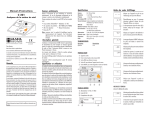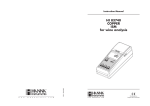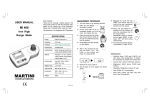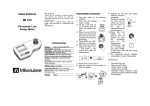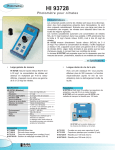Download Hanna Instruments TV Converter Box C 221 User's Manual
Transcript
Instruction Manual C 221 Honey Color Analyzer Preliminary Examination Please examine this product carefully. Make sure that the instrument is not damaged. If any damage occurred during shipment, please notify your Dealer. Each C 221 Honey Color Analyzer is supplied complete with: • Five Sample Cuvets • 12 VDC Transformer • One Light Shield Cap (HI 710005 or HI 710006) • One support for cuvets • 30 mL Glycerol (1 bottle) • Instruction Manual • Two 9V Batteries Note: save all packing material until you are sure that the instrument works correctly. Any defective item must be returned in its original packing. General Description www.hannainst.com This Instrument is in Compliance with the CE Directives Dear Customer, Thank you for choosing a Hanna product. This manual will provide you with the necessary information for the correct use of the instrument. Please read it carefully before using the analyzer. If you need additional technical information, do not hesitate to e-mail us at [email protected] or call 1-800-426-6287. This instrument is in compliance with directives. Warranty C 221 is warranted for two years against defects in workmanship and materials when used for its intended purpose and maintained according to the instructions. This warranty is limited to repair or replacement free of charge. Damages due to accident, misuse, tampering or lack of prescribed maintenance are not covered. If service is required, contact your dealer. If under warranty, report the model number, date of purchase, serial number and the nature of the failure. If the repair is not covered by the warranty, you will be notified of the charges incurred. If the instrument is to be returned to Hanna Instruments, first obtain a Returned Goods Authorization Number from the Customer Service department and then send it with shipment costs prepaid. When shipping any instrument, make sure it is properly packaged for complete protection. To validate your warranty, fill out and return the enclosed warranty card within 14 days from the date of purchase. All rights are reserved. Reproduction in whole or in part is prohibited without the written consent of the copyright owner, Hanna Instruments Inc., Woonsocket, Rhode Island, 02895 , USA. Hanna Instruments reserves the right to modify the design, construction and appearance of its products without advance notice. The C 221 portable microprocessor analyzer measures the percent light transmittance of honey compared to analytical reagent grade glycerol. The transmittance value allows identification of the honey Pfund grade. The instrument directly displays the measurement result expressed in mm Pfund. Measurements are made using matched square optical cuvets having a 10 mm light path. Display codes aid the user in routine operations. The meters have an auto-shut off feature that will turn the instrument off after 10 minutes of non-use. Specifications Guide to Display Codes SPECIFICATIONS Range Resolution Precision Typical EMC Dev. Light Source Method Light Detector Environment Power supply Auto-Shut off Dimensions Weight 0 to 150 mm Pfund 1 mm Pfund ±2 mm Pfund @ 80 mm Pfund 1 mm Pfund Tungsten lamp with narrow band interference filters @ 420 nm and 525 nm. Direct Measurement Silicon Photocell 0 to 50°C (32 to 122°F); max 90% RH non-condensing 2 x 9V batteries / 12 to 20 VDC through voltage adapter After 10' of non-use 230 x 165 x 70 mm (9.0 x 6.5 x 2.8") 640 g (22.6 oz.) REQUIRED STANDARD Description Glycerol Quantity/test 4 mL FRONT PANEL 1) 2) 3) 4) 5) Cuvet Holder Dual Level Liquid Crystal Display (LCD) READ key, to perform measurement CAL key, to calibrate the meter prior to measurement ON/OFF key, to turn the meter on and off Significance and Use Honey color varies naturally in a wide range of tonalities, ranging from light yellow to amber, dark amber and black in extreme cases; sometimes green or red hues may also occur. Color of untreated honey depends on botanical origin: for this reason color is very important for definition and commercial classification of monofloral honeys. Honey darkens with ageing, and other changes in color may result from beekeeper’s interventions and from the different ways of conservation (e.g.: use of old honeycombs, contact with metals, high temperatures, exposition to light, etc.). The primary characteristic for commercial honey classification is color. Color classes are expressed in millimeters (mm) Pfund grades, compared to an analytical grade Glycerol Standard Reference. Table 1 reports the USDA classification for honey samples and the related mm Pfund values. Table 2 shows the color of different monofloral honeys: data are obtained from a statistical set of honey samples. The table reports for each type of honey: average value of color, standard deviation, and the minimum and maximum values measured. This indicates that the meter is in a ready state and zeroing can be performed. Sampling in progress. This flashing prompt appears each time the meter is performing a measurement. The microprocessor is adjusting the light level, indicated by a scrolling "SIP". This indicates that the meter has been calibrated and measurement can be performed. The blinking "LOBAT" indicates that the battery voltage is getting low and the batteries need to be replaced. This indicates that the batteries are dead and must be replaced. Light over range. The cuvet is not inserted correctly and an excess ambient light is reaching the detector. If the cap is properly installed, then contact your dealer or the nearest Hanna Customer Service Center. The lamp is not working properly. Contact your dealer or the nearest Hanna Customer Service Center. The lamp is not working properly. Contact your dealer or the nearest Hanna Customer Service Center. This indicates that the meter has lost its configuration. Contact your dealer or the nearest Hanna Customer Service Center. REAR PANEL 1) Power Supply 12 VDC 2.5 Watt 2) RS 232 Socket 3) Batteries Compartment ERROR MESSAGES a) on zero reading: This indicates that the zeroing procedure failed due to a low signal-to-noise ratio. In this case press CAL again. The instrument cannot adjust the light level. Please check that the sample does not contain any debris. Recommendations for Users Before using these products, make sure that they are entirely suitable for your specific application and for the environment in which they are used. Operation of these instruments may cause unacceptable interferences to other electronic equipments, this requiring the operator to take all necessary steps to correct interferences. Any variation introduced by the user to the supplied equipment may degrade the instruments' EMC performance. To avoid damages or burns, do not put the instrument in microwave oven. For yours and the instrument safety do not use or store the instrument in hazardous environments. • Place the Glycerol cuvet into the holder. Then put the light shield cap on. Max. Value (mm Pfund) 27 119 35 71 71 110 130 35 119 71 27 83 71 83 Min. value (mm Pfund) 11 62 11 41 41 83 83 11 83 11 11 55 51 27 SD (mm Pfund) 6 19 5 11 11 8 16 6 10 17 5 10 6 16 BATTERY REPLACEMENT Battery replacement must only take place in a non-hazardous area using two 9V alkaline batteries. Remove the battery cover on the back of the meter, attach two fresh 9V batteries and replace the cover while paying attention to the correct polarity. AVERAGE (mm Pfund) 15 92 14 54 58 98 99 18 96 43 13 70 61 52 INTERFERENCES Interference may be caused by air bubbles or turbidity in the sample. Scratched or dirty cuvets will also affect readings. Always check clearness of cuvets prior to use. Accessories ANALYSIS KIT C219 Kit Kit for Honey Color analysis, including 82 cuvets, 30 mL of Glycerol and two 5 mL syringe (75 tests average) OTHER ACCESSORIES C215-00300 5 mL graduated syringe HI 710005 110VAC to 12VDC voltage adapter HI 710006 220VAC to 12VDC voltage adapter HI 721310 9V battery (10 pcs) HI 731318 Tissue for wiping cuvets (4 pcs) HI 731335 Caps for cuvets (4 pcs) Hedysarium coronarium Erica arborea Tilia spp. Rhododendron spp. Arbutus unedo Heliantus annus Thymus spp. • When the LCD displays “----”, the meter is ready. • To perform calibration, fill one cuvet with about 4 mL of Glycerol, up to 5 mm (0.2”) below the rim. This is the Glycerol Standard Reference. • The instrument directly displays the honey color intensity value expresses in mm Pfund, as compared to Analytical grade Glycerol (fixed at zero Pfund). latin name Robinia pseudoacacia Castanea sativa Citrus spp. Taraxacum officinalis Eucalyptus spp. MEASUREMENT PROCEDURE • Turn the meter on by pressing ON/OFF. • The meter will first perform an LCD self diagnostic test by displaying a full set of figures. • Then it will show a scrolling "c221 Hanna Inst" message. • Press READ and “SIP” will blink during measurement. Table 2 Honey Type common name Acacia tree Chestnut tree Citrus spp. Dandelion Eucalyptus Fir honeydew Fir tree honeydew French honeysuckle Heather Lime tree Rhododendron Strawberry tree Sunflower Thyme POWER CONNECTION Plug the 12VDC adapter (HI 710005 - 110VDC, or HI 710006 - 220VDC) into the DC socket. Plug the adapter into the outlet. Alternatively, remove the battery cover on the back of the meter; attach two fresh 9V batteries and replace the cover. Note: Insure the main line is surge protected. Note: Always turn the meter off before unplugging it to insure no data is lost. ≤ 8 or less 8 - ≤ 17 17 - ≤ 34 34 - ≤ 50 50 - ≤ 85 85 - ≤ 114 114 > CE Declaration of Conformity Operational Guide Water White Extra White White Extra Light Amber Light Amber Amber Dark Amber Color Range Pfund Scales (mm) > 1) A flashing value of “150” (maximum measurable value) indicates an over range condition. The color intensity of the sample is beyond the programmed range. 2) A flashing value lower than the maximum measurable value (e.g. 120) indicates a low signal-to-noise ratio condition. In this case accuracy of the result is not guaranteed. Repeat the reading procedure. USDA Color Standards Designations > Under range. A blinking "0" indicates that the sample absorbs less light than the Glycerol Reference. Check the procedure and recalibrate the instrument. • After a few seconds the display will show “-0.0-”. The meter is now calibrated and ready for measurement. • Remove the Glycerol cuvet. • Add to a second clean cuvet about 4 mL of honey, up to 5 mm (0.2”) below the rim. This is the sample. • Place the sample cuvet into the holder. Then put the light shield cap on. Table 1 > Calibration was not performed. Follow the instruction described in the measurement procedure for calibrating the meter. The instructions listed below should be carefully followed during testing to ensure best accuracy. • Use matched square cuvets, having 4 clear faces and a 10 mm path length. • Whenever the cuvet is placed into the measurement cell, it must be dry outside, and completely free of fingerprints, oil or dirt. Wipe it thoroughly with HI 731318 or a lintfree cloth prior to insertion. • It is important that the sample does not contain any debris. This would corrupt the readings. • Samples should be completely free of air bubbles. If bubbles are present, tap the cuvet on the table to remove them. • Press CAL and “SIP” will blink on the display. > b) on sample reading: Tips for an Accurate Measurement > There is not enough light to perform a measurement. Please check the preparation of the Glycerol cuvet. There is too much light to perform a measurement. Please check the preparation of the Glycerol cuvet. ISTC221R2 03/04



